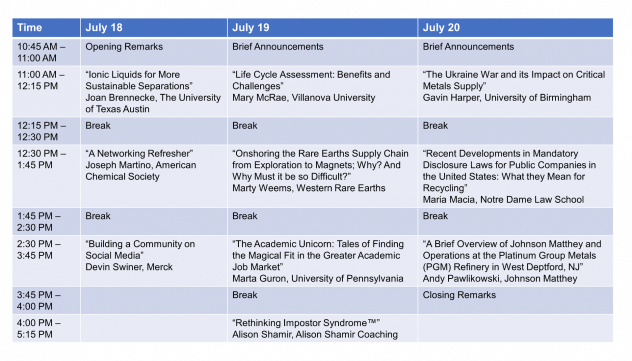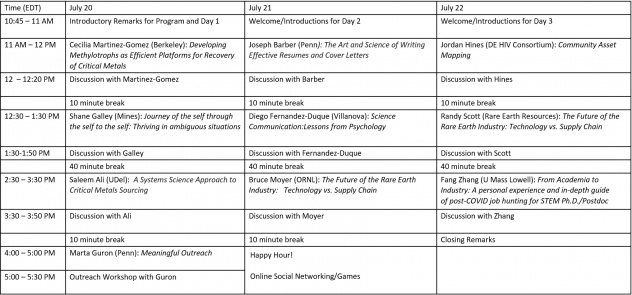2022 Program
Our final CSSM Sustainability Ambassadors Program was held July 18-20, 2022. The program continued to address concerns relevant to trainees in the center, namely ideas of separations science to impostor syndrome, exploring the academic job market, Ukrain War and its effects on critical metals, and industrial approaches to valorizing PGMs. We are so fortunate to have had such dynamic and open speakers in this program. The schedule included:
The program hosted a total of 71 attendees over all the talks. To find links to some of the talks, please click below:
Thank you to all our speakers and attendees!
2021 Program
The second annual CSSM Sustainability Ambassadors Program was held July 20-22, 2021. This is a cornerstone program for CSSM’s professional development efforts, where the goals are to provide trainees with unique knowledge and information for career and personal development that are adjacent to their research work.
The 2021 program gave trainees insights into new aspects of separations science from biological, industrial and economic lenses, provided concrete tips for how to approach a postdoctoral position and how to transition into an independent career from a postdoc as well as in writing resumes/CVS, and gave access to softer skills like thriving in ambiguity and amplifying scientific voices in science communication and governments. Additionally, the program acted as fuel for collaboration as trainees from across institutions worked together in workshops to provide future directions for Outreach programs and engaged in social activities and targeted discussions with speakers to encourage networking.
The schedule for the 2021 Program included:
As the program was conducted virtually, attendees spanned from across partnering CSSM institutions, as well as from university and community partners. The program enjoyed a little over 75 attendees spanning undergraduates, graduate students, and postdocs, as well as community participants.
Recordings from the Sustainability Ambassadors 2021 sessions may be found below, but may also be found as a
playlist on the CSSM YouTube page.
2020 Program
The first annual ‘CSSM Sustainability Ambassadors Program‘ was held August 3-5, 2020.
The 2020 program empowered trainees through specialized training and information about scientific publication, development of professional outreach programs, communicating with science journalists, science journalism as a career, patenting/intellectual property, commercialization of fundamental discoveries, critical materials policy, the environmental impacts of mining on local communities, time management, maintaining mental health in academic research, and fostering character traits of grit and resilience.
The speakers were from a range of expertise and backgrounds including the fields of history, venture capital/finance leadership, journalism, policy, and psychology. Speakers for this workshop included:
Prof. George Schatz,
Northwestern University
Scientific Publishing |
Prof. Jonathan Sessler,
UT Austin
Commercializing Discoveries in Fundamental Science |
Prof. Jen Shafer,
Colorado School of Mines
Developing Time Management Skills for Researchers |
Dr. Roger Turner,
Science History Institute
Developing a Professional Outreach Program |
Dr. Roger Pettman,
Executive Chairman, Cycladex Inc.
Starting a Company in Gold Recycling |
Prof. Suzanne Bart,
Purdue University
Mental Health in Academic Research Training |
Dr. Maddie Stone,
Freelance Journalist
Science Communication, Critical Materials, and Journalism Careers |
Angela Pachon,
Kleinman Center for Energy Policy
Critical Metals and Renewable Energy Policy |
Prof. Julie Klinger,
University of Delaware
Impact of Rare Earth Extraction on Local Communities |
Having shifted the CSSM Sustainability Ambassadors Program online for the inaugural workshop, we also opened the program to all members of the chemistry departments at Penn, Purdue, Colorado School of Mines, UT Austin, and Northwestern. The event had 75 registrants from undergrad, grad, postdoc, faculty, and staff populations of those departments.
Here are links to some of the recorded speakers:


